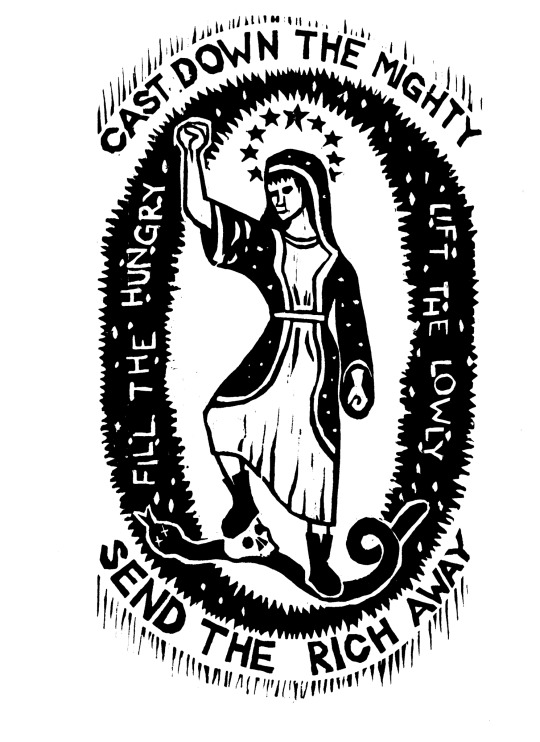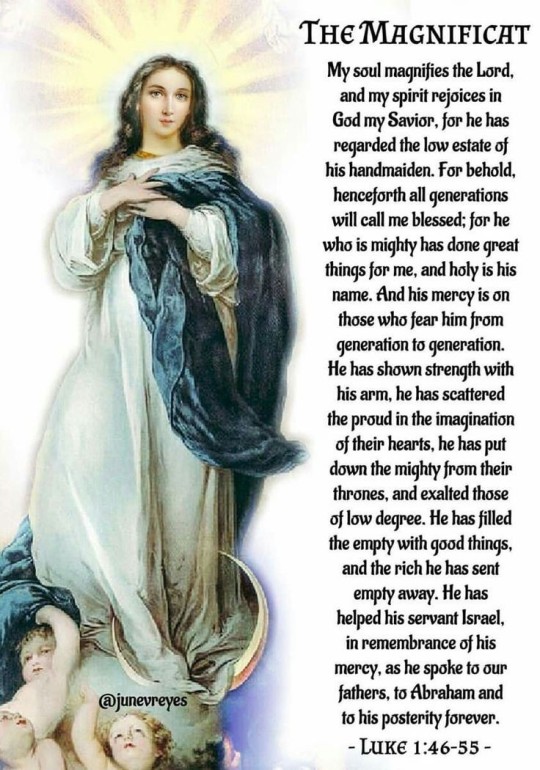#Magnificat
Explore tagged Tumblr posts
Note
What does it mean you support the Magnificat? Genuine question, I am catholic but never heard about that term
The Magnificat is a canticle/prayer/song, also known as The Song of Mary! It's found in the Bible, amongst narrative of the Visitation, (Luke 1:46-55) when the Virgin Mary goes to visit her elderly pregnant cousin, Elizabeth, the mother of John the Baptist). Magnificat means "my soul magnifies the Lord".
The Magnificat is a deeply revolutionary hymn. Many leftist/working-class Christians throughout history have particularly taken a stronghold to it. Especially, since it says some really beautiful lines like:
"He [God] has scattered the proud in their conceit. He has cast down the mighty from their thrones, and has lifted up the lowly. He has filled the hungry with good things, and the rich he has sent away empty." [x]
For more modern instances, we have 'The Magnificast', which is precisely a leftist Christian podcast. And we have work like Ben Wildflower's Magnificat woodcut, who is an Episcopalian anarchist. It's also deeply meaningful within Catholic Latin American/liberation theology history.
To me, being a "magnificat supporter," is a funny/niche/cheeky way of saying where my politics lie. i'm a leftist !

#magnificat#the magnificat#the magnificast#ben wildflower#ask away!#anon questions#anon#id in alt text
101 notes
·
View notes
Text
imagine being just Some Dude with a Ghastly Market stand and suddenly seeing 2 kids and a Magnificat run past and chaos ensue in their wake. like bro I just wanted to sell some unnimal organs I need this money to pay my rent
127 notes
·
View notes
Text

And Mary said: ‘My soul magnifies the Lord and my spirit rejoices in God my Saviour, for He has been mindful of the humble state of His servant. From now on all generations will call me blessed, for the Mighty One has done great things for me – holy is His name. His mercy extends to those who fear Him, from generation to generation.
Luke 1:46-50
Mary’s song, known as the Magnificat, is awe inspiring. Mary's words display an attitude of thankfulness in the face of ridicule and condemnation. Mary could have focused on the situation and felt nothing but fear. Fear of rejection, fear of being ostracized. Instead, she focuses on praising her Creator and her Saviour. The message for us is that we are to have faith and trust in our God. No matter the situation or circumstance, God has it all in His hands, that should cause us to praise and thank Him always. Not just this Christmas season, but all seasons.
#bible verse#daily devotional#christian quotes#bible quotes#inspiration#daily devotion#christian quote#christian life#scripture#bible#mother mary#mary mother of jesus#magnificat
207 notes
·
View notes
Text

My spirit animal is a magnificat
Lightweight hoodie and other products with this design are available on my Redbubble :)
#nevermoor#morrigan crow#jessica townsend#wundersmith#hollowpox#nevermoor series#fenestra nevermoor#magnificat#ya fantasy#nevermoor: the trials of morrigan crow
21 notes
·
View notes
Text

would you still accept him?

Meowgnifico or Magnificat? What are we going to call him?
#king magnifico#wish#disney wish#wish magnifico#wish disney#wish movie#wish 2023#Magnificat#Meowgnifico
134 notes
·
View notes
Text
The Assumption

“My soul proclaims the greatness of the Lord; my spirit rejoices in God my Savior.”
The Magnificat, Mary’s hymn of joy, marks the first time anyone recognized her as the mother of Our Lord. And it marks the beginning of Mary’s public ministry.
Wait. What? Mary had a public ministry?
We don’t have any Mary parables. She wasn’t out teaching, healing the sick, raising the dead, or any of that stuff.
Right. Because that wasn’t her public ministry. Mary’s public ministry wasn’t being Christ.
Mary’s public ministry was being a Christian. Being the first Christian.
With Mary’s “yes,” she was all in. No reservations. Nothing held back. 100% in for God’s plan.
Which means that Mary lived the faith. Without counting the cost.
So it should surprise no one that we look to her as our model. Our first and best example of how to follow Jesus. Of what it really means to be a Christian.
And the Assumption? If we see Mary for who she really is, the first Christian. The first to be 100% in. Then it makes perfect sense that the God who was with her every step of the way would bring her home.
Good for her. But what does any of that mean for you and me, two millennia later?
It means that Mary is our example of how to live the faith, our roadmap. In the face of all of the heartache and all of the tears, with all that she went through, Mary shows us what it really means to be a Christian.
The Assumption is nothing less than proof of God’s promise. God’s promise to Mary. God’s promise to each one of us.
That in spite of the heartache, in spite of the tears. That no matter what we go through. God will be with us, every step of the way. And that at the last, God will bring us Home.
Today’s Readings
#Assumption#Magnificat#Mary#100%#God's Promise#God#Jesus#Catholic#Christian#Church#Catholicism#Christianity#Moments Before Mass
24 notes
·
View notes
Text

“𝘔𝘺 𝘴𝘰𝘶𝘭 𝘮𝘢𝘨𝘯𝘪𝘧𝘪𝘦𝘴 𝘵𝘩𝘦 𝘓𝘰𝘳𝘥..."
#jesus#catholic#my remnant army#jesus christ#virgin mary#faithoverfear#saints#jesusisgod#endtimes#artwork#Jesus is coming#Mother Mary#Fiat#magnificat#pray for us#blessed mother#bibleversoftheday
291 notes
·
View notes
Text

9 notes
·
View notes
Text

And Mary said:
“My soul glorifies the Lord and my spirit rejoices in God my Savior, for he has been mindful of the humble state of his servant. From now on all generations will call me blessed, for the Mighty One has done great things for me— holy is his name. His mercy extends to those who fear him, from generation to generation. He has performed mighty deeds with his arm; he has scattered those who are proud in their inmost thoughts. He has brought down rulers from their thrones but has lifted up the humble. He has filled the hungry with good things but has sent the rich away empty.
He has helped his servant Israel, remembering to be merciful to Abraham and his descendants forever, just as he promised our ancestors.”
--Luke 1:46-55
Photo: Palermo, Sicily, Italy
#magnificat#mary#virgin mary#christmas#christmas story#luke 1:46-55#praise god#god loves women#mary's song#christianity#faith#hope#inspiration#christian living#the holy bible#god's word#holy scripture#italy#palermo#sicily#italia#sicilia#bella italia#street art#europe#european history#nativity#merry christmas#feliz navidad#happy holidays
14 notes
·
View notes
Text
youtube
Daniel Purcell (c.1670-1717) - Magnificat in E Minor ·
Chichester Cathedral Choir · Alan Thurlow
6 notes
·
View notes
Text
Mary's Song

So today, at church, we covered the Magnificat, or Mary's song. It's the song of celebration she sings when visiting her cousin Elizabeth and finding they're both unexpectedly pregnant, and both subject to frightening and difficult prophecies. Reading Mary's Song is a standard part of the advent of Christmas in my tradition - in most Christian traditions in fact.
And I learned something I didn't know. Apparently the Magnificat has been banned in various countries at various points of history, because it's been considered dangerously revolutionary. British-occupied India, for example, and Argentina in the 1970s.
Why would a modern regime ban a passage from the Christmas story, a poem attributed to a dirt-poor teenager living under military occupation and social condemnation, thousands of years ago?
I think this might be the bit that upset them:
He has brought down rulers from their thrones but has lifted up the humble. He has filled the hungry with good things but has sent the rich away empty.
(Luke 1: 51-53)
If you're looking for something to write on a banner to annoy people in power, this would do the job, wouldn't it? Especially if those people in power are claiming to be Christian.
4 notes
·
View notes
Text
Luke 1:45 BSB
[45] Blessed is she who has believed that the Lord’s word to her will be fulfilled.”
3 notes
·
View notes
Text
Why you should share your hyperfixations
Listening to a Magnificat playlist, as ya do, and I just hit a cluster of early renaissance pieces, and had a memory pop up of being in college and rearranging my voice mail to be 10 seconds of me saying, "I know exams are coming up and you're stressed, so before you leave a message, listen to a few phrases of this Guillaume Dufay piece," followed by music all the way to the beep.
One day when I got home, there were four calls from my music history prof, who kept coming back to listen, even though I know for a fact that as the person who made me a fan of Dufay, he had better recordings. He was just so excited that something from the term really landed with someone.
youtube
3 notes
·
View notes
Text

7 notes
·
View notes
Text
The Assumption

“My soul proclaims the greatness of the Lord; my spirit rejoices in God my Savior.”
The Magnificat, Mary’s hymn of joy, marks the first time anyone recognized her as the mother of Our Lord. And it marks the beginning of Mary’s public ministry.
Wait. What? Mary had a public ministry?
We don’t have any Mary parables. She wasn’t out teaching, healing the sick, raising the dead, or any of that stuff.
Right. Because that wasn’t her public ministry. Mary’s public ministry wasn’t being Christ.
Mary’s public ministry was being a Christian. Being the first Christian.
With Mary’s “yes,” she was all in. No reservations. Nothing held back. 100% in for God’s plan.
Which means that Mary lived the faith. Without counting the cost.
So it should surprise no one that we look to her as our model. Our first and best example of how to follow Jesus. Of what it really means to be a Christian.
And the Assumption? If we see Mary for who she really is, the first Christian. The first to be 100% in. Then it makes perfect sense that the God who was with her every step of the way would bring her home.
Good for her. But what does any of that mean for you and me, two millennia later?
It means that Mary is our example of how to live the faith, our roadmap. In the face of all of the heartache and all of the tears, with all that she went through, Mary shows us what it really means to be a Christian.
The Assumption is nothing less than proof of God’s promise. God’s promise to Mary. God’s promise to each one of us.
That in spite of the heartache, in spite of the tears. That no matter what we go through. God will be with us, every step of the way. And that at the last, God will bring us Home.
Today’s Readings
18 notes
·
View notes
